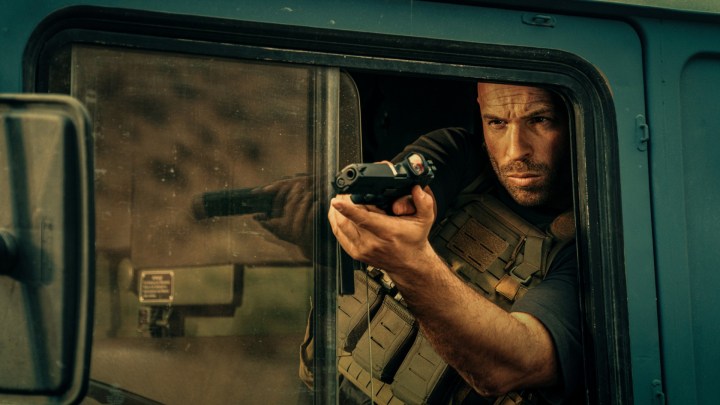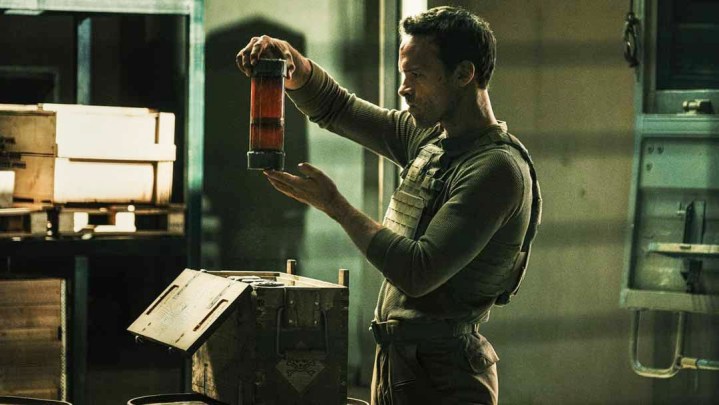
It might come as a surprise that there’s a new version of The Wages of Fear streaming on Netflix right now. With the caution of a driver carting explosives across a stretch of bumpy road, this French remake of a French classic sputtered onto the platform. Promotion has been minimal, and you have to go looking for the movie to find it on the homepage, where it sits several thumbnails deep on the “New Releases” carousel. As of this writing, there are no reviews on Rotten Tomatoes … mostly because Netflix didn’t make the film available in advance. If a truck explodes in the desert and there’s no one around to stream that explosion to their device, does it make a sound?
Frankly, a silent release is probably the right move for this particular international acquisition. Not since the much-maligned Netflix remake of Rebecca — a novel previously adapted by Alfred Hitchcock — has a milestone of suspense been so ruinously upgraded for the 21st century. Directed and co-written by Julien Leclercq, the new Wages transports its tense scenario from the midcentury South America of Henri-Georges Clouzot’s 1953 original to a more contemporary and arid backdrop. The most significant changes, however, have less to do with setting than the nature of the ordeal the film chronicles. One of the most nerve-wracking genre premises ever has been pointlessly amped up: more gunplay, more characters, more romance and heroism.
As originally conceived by novelist Georges Arnaud, that premise is a model of nightmare minimalism, easily communicated via logline: A group of economically desperate men embark on a likely suicide mission, hauling two trucks full of unstably stored, highly volatile nitroglycerin across hundreds of miles of inconsistently paved terrain. There’s a big payday waiting for them on the other side, but will they live to collect? Hit the wrong bump along the way, and the cargo goes spectacularly up in flames.
Even if you’ve never personally white-knuckled your way through The Wages of Fear (the first movie or its out-of-print source material), you’ve probably felt its aftershocks. When Keanu Reeves climbed aboard a bus that couldn’t slow down in the 1994 action triumph Speed, he was steering down a road Clouzot paved four decades earlier. There’s a little of Wages in the Mission: Impossible franchise, with its escalating gauntlets of blink-and-die danger. And Christopher Nolan cited the movie as an influence on his Dunkirk, another suspense contraption that subjected frazzled men to a precarious crucible.
And of course Wages has been remade before. The last official stab at reviving its assault on the nerves was 1977’s misleadingly titled Sorcerer, a costly Hollywood flop directed by the late William Friedkin. Though the director made his own tweaks to the story — moving it into a then-modern world of terrorist attacks and ruthless oil conglomerates — he preserved its simplicity. Four men. Two trucks. A dangerously detonatable cargo. Potential death around every bend.
The first Wages is still the ideal treatment of Arnaud’s ingenious, anxiety-inducing plot. After a perhaps overly protracted first act – a problem, truth be told, with all the adaptations, though Sorcerer handles the setup with more hypnotic style — Clouzot gets his anti-heroes behind the wheel and begins tightening the lug nuts. The obstacles facing the men are myriad. Drive too slow over the more textured stretches of road, and the truck might lurch too much and jostle the payload. Drive too fast, and you might lose control on a turn, and the explosive result is the same. Even the proximity of the two trucks to each other becomes a source of potential calamity; without the proper distance between the two, a one-lane route can easily become a collision course.
Clouzot hard-wires his audience to the nagging, expanding stress of his characters. We’re strapped right in there with them, feeling every inconvenient bump, wary of every upcoming obstacle posed by the landscape. It’s maybe the most literal demonstration ever of Hitchcock’s explanation of suspense as a bomb under the table that doesn’t explode. (Not for nothing was Clouzot often referred to as the French Hitchcock; he’s even said to have rushed to secure the rights to Arnaud’s book out of fear that the Master of Suspense might get to them first.) Wages is such a perfect instrument of anxiety that it’s actually rather surprising that there haven’t been even more attempts to do it again.
Maybe most have had the good sense not to try. Or maybe the commercial underperformance of Sorcerer, roundly ignored by the public in the summer of Star Wars, created the diesel stink of folly around the idea. Friedkin’s movie has been thankfully reclaimed in recent years, recognized as a rough-and-tumble classic in its own right. Though it may have trimmed some of the complications Clouzot exquisitely exploited, it justifies its existence via the pure physicality of the filmmaking. Friedkin gave those trucks a hellish center of gravity, making us feel their monstrous weight. The movie’s most famous sequence is a deranged practical stunt in which the director guided a real gas-guzzler over the most rickety bridge in all of South America — a spectacle of foolhardy perseverance on the part of the characters and filmmakers alike.
There’s nothing remotely as queasy-exciting in the new Wages. The best that can be said for the film is that it’s competently staged. But in retooling Arnaud’s timeless conceit for a new audience and era, Leclercq transforms it into something more generically diverting. Rather than hard-edged, mismatched outlaws, united only through a mutual dearth of options, the main characters are a pair of handsome brothers (Franck Gastambide and Alban Lenoir) mending their broken relationship after a robbery gone wrong. That’s the melodramatic fuel of their 500-mile pilgrimage, which plays less like an existential death trip — like an obstacle course of doom — than one of the sleek, international heist thrillers that have become Netflix bread and butter.

Worse still, this Wages distrusts the gut-wrenching power of its borrowed premise. Past adaptations suggested that every inch crossed on the road to delivery and deliverance could lead to fiery destruction, but Leclercq’s characters barrel along with blithe indifference to the liquid dynamite in the trailer. And that’s because the movie baffles their long drive into a series of high-speed chases and action-movie skirmishes, as bad guys put bullets in the trucks without sending them sky high. At one point, one of the brothers ends up standing on a landmine, and you have to wonder: Why did the film have to introduce a new form of explosive device when the very cargo they’re carrying is a variable bomb itself? The answer is that this Wages can’t wait to get out of the truck. It hasn’t the patience for the game it’s playing.
You don’t need faceless goons or backstabbing comrades or even the ticking clock (“You have 24 hours,” someone essentially intones) that Leclercq introduces here. The Wages of Fear, as it was written and first translated to the screen, is more elemental than all that. The enemies of the story are gravity and topography and speed and earth itself. To try and turn such a fatalistic thriller into something more fast and furious — complete with shootouts and blatantly fake CGI explosions — is to misunderstand its appeal.
In its truest form, The Wages of Fear is an impeccably bleak suspense contraption. It makes the very act of moving forward into a life-and-death proposition. It takes noir to its logical endpoint, with characters so screwed by their bad decisions and bad luck that one false turn could end it all for them. And in its portrait of men cornered into taking the worst job out there, it’s an enduring parable of strangulating capitalism — an element mostly defused by the more apolitical new version. You’d think a premise as potent as The Wages of Fear would be hard to screw up. But in the streaming age, there’s a bomb waiting around every corner and in every “Recommended For You” queue.
The Wages of Fear (2024) is now streaming on Netflix. The Wages of Fear (1953) is now streaming on Max. Sorcerer is available to rent or purchase from the major digital services. For more of A.A. Dowd’s writing, visit his Authory page.



